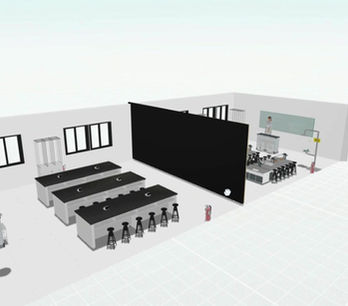
LABOR OF LAB:
Project Background
On the 27th of December, the USHS Class of 2003 Reunion Officers, composed of President Joy Arvin Sadaran, Vice President Roxanne Paraguison-Asuque, Secretary Kristel Marie Orden, and Finance Representative Hardee Allen Sayco-Lantan, convened with current school head, Dr. Aileen De Guzman, to probe into the most pressing needs of our esteemed alma mater, University Science High School. The primary objective of this meeting was to identify areas where our Class of 2003 could meaningfully contribute to the ongoing development and improvement of the school. Through open communication and a collaborative spirit, we sought to gain a comprehensive understanding of the current challenges faced by the institution.
During the meeting, we went on a guided tour of the campus to further inform our discussions and gain firsthand insight on the school’s concerns. Throughout the tour, we encountered numerous instances where the facilities' condition warranted immediate attention. Realizing the impact of these limitations on the daily lives of the students was particularly poignant. It served as a stark reminder of the crucial role a well-maintained and well-equipped school plays in nurturing young minds and fostering their potential.
While the current state of the facilities may appear disheartening, it has only strengthened our resolve to contribute to the betterment of USHS. We remain confident that by working together with the school administration, alumni, and the wider community, we can create a learning environment that truly empowers every student to thrive and make a tangible difference in the lives of current and future students.
Lack of Lab
During our visit to the University Science High School (USHS), we identified a critical need for the establishment of a dedicated and well-equipped science laboratory that can adequately support coursework in Chemistry, Physics, and Earth Science. The absence of a suitable science laboratory hinders the school's ability to provide its students with a comprehensive and practical learning environment in these crucial scientific disciplines.
The Integrated Technology Building (near 7-Adventurers room) is currently being used as the school’s laboratory. It lacks proper equipment, storage, fixtures, and air conditioning. The students are using dilapidated and makeshift tables salvaged from other areas of the school. Some windows are broken and there are no sinks and cabinets. During the pandemic, most of the lab equipment have fallen into disrepair and rendered unusable. Hence, the teachers are making do with whatever was left fit for use.




Due to limitations within the designated laboratory, science teachers are occasionally required to utilize the Audio-Visual Room as an alternative science classroom However, this temporary solution presents several challenges that hamper effective instruction.
The Audio-Visual Room's size is inadequate to accommodate the typical class size, hindering optimal learning conditions. Additionally, the room lacks proper laboratory tables and essential equipment, and suffers from deteriorated cabinetry, further compromising the learning environment and the quality of practical learning experiences.




THE VISION
These are the state-of-the-art laboratories at a known private school in Metro Manila, which serve as an inspiration for our donation project.
.jpg)

The logo of the "Labor of Lab" initiative features a heart-shaped Erlenmeyer flask. This visual representation embodies our dual passions: a profound love for science and a deep affection for our alma mater, the University Science High School.
The two hands clasping together, forming the heart shape, serve as a powerful symbol of collaboration. They signify our unwavering belief that achieving our ambitious goals for the school can only be realized through our combined efforts and collaborative spirit.

THE PLAN
The University Science High School Class of 2003 is committed to spearheading the initiative to rehabilitate and upgrade the school's science laboratory. However, the success of this endeavor hinges on the collective efforts and generous contributions of our esteemed alumni and the wider community.
Phase 01: Standardization and Equipping
Through the Labor of Lab Donation Project, we plan to equip the laboratory with tables, stools, and cabinets that meet the established standards set forth by the Department of Education. We also aim to modernize the USHS laboratory by providing an updated basic set of scientific equipment and tools to facilitate effective instruction and research aligned with the current curriculum in science and technology.
Proposed Laboratory Layout
Perspective render by Kristel Marie Orden
Proposed Laboratory Kit
VISSER (Versatile Instrumentation System for Science Education and Research) is a science kit that allows students to conduct over 50 experiments in biology, chemistry, physics, and earth science. A handheld device, it can be used without a computer and can be powered by battery or power bank.
VISSER is a technology funded and supported by the University of the Philippines Diliman and the Department of Science and Technology.

How much do we need?
The following provides a cost projection for the successful implementation of our plan.
Laboratory Tables and Stools
Approx. Php606,000
Cabinets
Approx. Php120,000
Teacher's Desks
Approx. Php70,000
Tools and Equipment
Approx. Php120,000
Electrical, Plumbing and Manpower
c/o CLSU PPSDS
Other Materials and Needs
Approx. Php84,000
PHP 1,000,000
Target Amount for Labor of Lab (Phase 01)

IMPORTANT NOTE
This proposal is based on existing quotations and references to provide a clear starting point. However, we've designed it to be adaptable. We can adjust the plan as needed, taking into account current circumstances, any changes in actual costs, the availability of materials and equipment, and the final amount of funding secured.

Project Timeline

We are aiming to complete the new laboratory in time for the start of the upcoming school year in August 2024. This timely completion will ensure that the students have access to the necessary equipment to fully support their science curriculum right from the beginning of the academic year.










